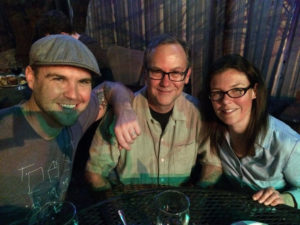Remembering a Remarkable Heart: Dr. Stephen Brabeck, M.D.

Born in St Paul, Minnesota in 1950, Steve Brabeck was the youngest of four boys. Similar in many ways to his brothers, Steve was different in one important way. He was born with a congenital heart defect (CHD) called Tetralogy of Fallot. Considered a classic “blue baby” due to his oxygen-starved blood and blue-tinted skin, Steve had a hard time keeping up with his brothers.
Steve’s older brother, Dr. Michael Brabeck, M.D., recalled in his book Heart that Steve would play as a child, “but he would tire easily. His puffing spells, always unpredictable, were becoming more frequent as he grew.” Michael continued, “We were not allowed to tease Stevie, chase him, or otherwise upset him… For the most part we were careful with him so as not to cause more puffing, since those spells could be frightening.”
In the 1950s, heart screenings were common in the US, but surgical interventions to repair heart defects were not. In 1955, at the age of five, Steve Brabeck became one of the first successful patients to receive open heart surgery; a feat made possible by a new invention at the time, the heart-lung bypass machine.
In the past 70 years, medical technology has advanced at dizzying speeds, enabling safer and more successful cardiac interventions for US patients. Unfortunately, the rest of the world does not necessarily benefit from these medical advances equally. Today, globally, 9 out of 10 children with heart defects go untreated, often because they are unaware that their failure to thrive is related to a heart condition.
Brabeck was one of the lucky ones. He lived in the right place, at the right time, with the right technology to save his life. Stevie eventually became Dr. Stephen Brabeck, M.D., an adult cardiologist, and father to five. His daughter, Annelise Brabeck, admits that even today she feels it is an “absolute miracle” that he survived. She says his near brush with death in childhood shaped his relentless drive and mindset to be present and live fully. A “warrior from the beginning,” Annelise says that his way of thinking inspired her growing up and continues today.
In 2018, at the age of 67, Steve Brabeck passed away. At the time, he was the longest living recipient of open heart surgery in the world. A little more than two years later, Steve’s family, led by eldest daughter Annelise Brabeck, decided to honor him by holding an online fundraiser to benefit One Heart Health’s heart screening efforts. Nearly $2,000 was raised by family and friends to fund heart screenings for children living in remote and rural settings. Kids who otherwise lack access to cardiac care.

Steve’s legacy for supporting patients with congenital heart defects, the most common of birth defects, is deep. He founded the Adult Congenital Heart Association and contributed to CHD research until the very end. Steve knew his experiences, even while battling cancer, would be a valuable resource to medical researchers studying the long-term effects of CHD interventions. His daughter explained, “Perhaps children that are as young as 10, 15, 20 – hopefully they won’t have to go through what he went through.”
At his core, Annelise said her father spent his life helping others. Supporting One Heart Health’s work to identify children born with congenital heart disease is no different. The Brabeck family plans to hold its second Steve Brabeck memorial fundraiser for One Heart Health, later this year.
Support One Heart Health
While most newborns in the United States are screened for congenital heart disease at birth, vast numbers of newborns in the world do not have access to the same healthcare. We invite you to continue the Brabeck family’s legacy and help us work towards a future where every child born with heart disease is given the chance to live a healthy life.
Please consider making a tax-deductible donation to support One Heart Health and its work by clicking HERE. Contact us to learn more about opportunities to honor an important person or event in your life through a fundraiser for One Heart Health.



